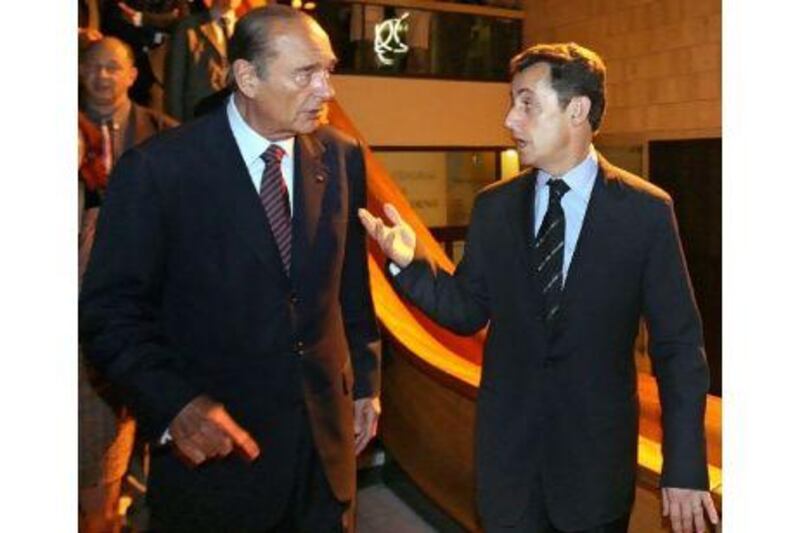MARSEILLES // The French president, Nicolas Sarkozy, is portrayed as impetuous, arrogant and disloyal in the long-awaited second volume of the memoirs of Jacques Chirac, the man he succeeded at the Elysée palace.
Mr Chirac, 78, has not previously given a public assessment of Mr Sarkozy, 22 years his junior and once considered his protégé.
He pulls few punches in a book widely forecast to be a bestseller, possibly adding to the current president's problems as he prepares for hazardous elections next spring.
Mr Chirac, despite facing criminal trial in September on political corruption charges dating from his time as mayor of Paris, enjoys remarkable popularity at the same time as his successor, Mr Sarkozy, struggles with dismal opinion poll ratings.
Tension between the two men goes back to 1995, when Mr Chirac was furious that a man whose political career he had championed should have thrown his weight behind a centre-right presidential rival, Edouard Balladur.
Mr Chirac, explaining his decision to overlook Mr Sarkozy twice for the role of prime minister, in 2002 and 2005, writes: "The risk would have been finding myself quickly faced with a head of government ready to affirm his independence and challenge my prerogatives without trying to hide that he wants to be my successor."
In 2002, Mr Chirac gave the premiership to Jean-Pierre Raffarin, believing that although Mr Sarkozy appeared the best man for the job, there were "too many grey areas and misunderstandings" between them.
Mr Chirac acknowledges the energy, work ethic and media skills of Mr Sarkozy but questions his choice of language and accuses him of adopting an antagonistic style that threatens the institutions of state.
"We do not share the same vision of France," Mr Chirac writes. "We are not agreed on the essentials."
Once in presidential office, Mr Chirac struggled to reconcile his distaste for Mr Sarkozy's manner and his admiration for "one of the most gifted politicians of his generation", and gave him key cabinet posts. It would have been wrong, he writes, to deprive the French people of a minister of his talents.
The book, The Presidential Time, Memoirs Vol 2, appears in French shops today. Its publication closely follows the release at the Cannes film festival of La conquête, a warts-and-all depiction of Mr Sarkozy's rise to power.
In common with the film, the memoirs - the first volume of which sold an impressive 370,000 copies - provide ample ammunition for admirers and detractors of both men.
Mr Chirac's supporters, who make light of his forthcoming trial for allegedly paying friends and allies for non-existent Paris city hall jobs, will feel it reinforces the former president's qualities as a more refined, discreet and statesmanlike figure.
But Hervé Gattegno, editor-in-chief of the news magazine Le Point, has suggested that in trying to wound Mr Sarkozy with "petty attacks", Mr Chirac may succeed only in boosting him.
The former president has expressed irritation that "a few sentences here and there in a book of 600 pages" have been used to show enmity.
In an interview with the conservative daily Le Figaro, he insists relations with Mr Sarkozy now are "frank, cordial and personal".
Even so, extracts that have been published do suggest Mr Chirac's view of the current president has been influenced to some extent by personal grievances. Particular mention is made of what Mr Chirac seems to have taken as an inexcusable slight after the 2007 presidential elections.
Le Figaro has reminded readers that in Mr Chirac's own retirement speech, he "pointedly declined to advise voters to back Sarkozy". Yet this did not stop the outgoing president feeling deeply wounded when Mr Sarkozy failed to mention him in his televised victory address.
Mr Chirac describes watching from the Elysée: "Each of us listened with the greatest attention to every sentence, every word he utters, secretly waiting for the moment he would doubtless mention the name of the man he is about to succeed, or even thank him for the support that he had received from him.
"But that moment would never come. Deep down I was very hurt and I knew from then on what kind of person I was dealing with."
Mr Chirac sums up the president in these words: "Highly strung, impetuous, overflowing with ambition, no doubts about anything, himself in particular."
He criticises the "intemperate" use of language Mr Sarkozy adopted when promising to drive young criminals he described as la racaille - which can mean "riffraff" but translates, at its worst, as "scum" - from housing estates, and threatening to use a Karcher, or high-pressure cleaner, to do so.
On the Chiraquien analysis of events preceding the autumn riots that swept France, Mr Sarkozy's abrasive approach had the effect of "exacerbating antagonisms" and pitting sections of society against each other.
Mr Chirac also appears to have taken exception to Mr Sarkozy's mockery of Japanese sumo wrestling, one of Mr Chirac's passions.
Mr Sarkozy once asked: "How can anyone be fascinated by those fights by obese guys with Brylcreem buns?"
For those who detect an element of score-settling in the memoirs, there is at least one further piece of evidence.
Without passing judgement on the Sarkozy presidency, Mr Chirac offers warm praise for the qualities of François Hollande, who currently seems the likeliest socialist challenger when Mr Sarkozy seeks re-election in 2012.
Mr Hollande is a "true statesman", Mr Chirac said in the book. At the weekend Mr Chirac went further, telling reporters he would vote for him next year.







